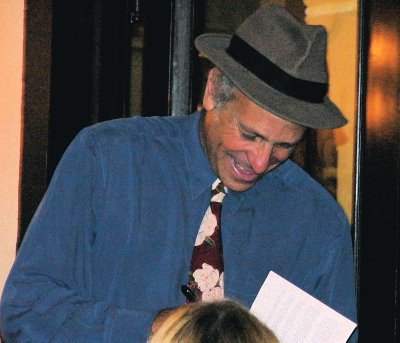Once upon a time, in a small college town in Florida, there was a highly-regarded school full of young men and women who loved to write. They spent their days in rooms filled with long Formica banks upon which several dozen IBM Selectric typewriters were lined up. They thrilled to the ambient clickety-clicking and the soft
whoosh of paper being pulled from the grip of the rubber roller, signaling another deadline met, another passing grade somehow fished from the swamp of frustration and impediment. And when it was nighttime, the young scribes gathered on various floors of the school’s mammoth library where they scrolled through microfilm or climbed through the stacks to find a certain journal, a particular article, or a special citation that would feed their work for another day.
Getting paid for doing what we loved? That was our Holy Grail. And the University of Florida College of Journalism and Communications was our testing ground, our winding and sometimes grueling path.
In the late 70’s and early 80’s, I sought a degree in advertising. I believed I could shape the clever sentences that sell a box of cereal; I wanted to come up with charming names for lipstick colors and create the scripts for hilarious television advertisements, the kind that people talk about long after the Superbowl. As commercial as my chosen field was, however, I was required to take the same basic journalism classes as writers or reporters who aspired to positions with, say, The New York Times or CBS News.
The classes I remember best, the ones taught by professors whose voices I can still hear, included
Journalism 101, the starting point for every dreamer able to master at least 40 words per minute on those aforementioned IBM typewriters.
Then, of course, there was
Ethics in Journalism, a serious and provocative class that, above all else, drilled into our heads the role of the journalist as it was in times past, and as it continues to be in the modern age; which is to say, to serve as the keeper of that crucial safeguard, that very last membrane between the truth and whatever embodiment of power might seek to distort it. And further, that the journalist must not himself become the story; that he must resist the human tendency to agree with one side or the other and shape his words accordingly; and that--as affected or precious as this might sound--the master he served above all others was the Truth, and his only meaningful duty was to make that truth known.
And finally, there was
Journalism Law, in which we learned that malice has no role in our work, that there is an enormous difference between a private person and a public figure--not the least of which is the breadth of information one can and should reasonably report about said figure without fear of reprisal--and that in matters of slander and libel, truth will always be an absolute defense.
-----Lately, I’ve been thinking about those classes a great deal. I watch a White House press conference during which a journalist asks a straightforward question about the ongoing war in which our country is engaged, and then, for his effort, receives a reply constructed of circular sentences, words that are little more than semantic repetitions and that double back on themselves, running rings around the original query just long enough for the Press Secretary to locate another raised hand and change the subject.
I regard the news before me, watching and reading the reports that tell us, in their ever-shifting and elliptical ways, why we barged into Iraq with guns blazing, and in so doing, racked up a breathtaking and unprecedented debt; and most importantly, why the blood of Americans, Britons, soldiers of other nations, and indeed, Iraqi citizens is being spilled day after day, year after year. I reflect on the fact that these reports are written by people like my former classmates and me; in fact, it’s likely that many actually
are being written by some of my former classmates. And at the risk of upsetting my Journalism 101 professor, I will invoke the passive voice one more time and say,
The reports are written by reporters. Reporters who surely, somewhere in their collective youth or childhood, must have believed that telling the truth was their moral imperative. Who must have believed, Once Upon a Time, that as powerful as an enterprise built of fiction or fallacy might be, it cannot surmount the truth.
And yet. My questioning, scribbling colleagues, those writers who once wished only to be paid for doing what they loved, are suddenly unrecognizable. They’re gloss-painted and coiffed; they dabble in the facile arts of gossip and line-delivery; they condescend to their numb audience, filling their columns and airtime with strangely infantile instructions on how to get dressed in the morning, how to feed oneself properly, how to
have it all.
-----I watch, I read, and it’s my abject conclusion that, in large measure, journalism itself has passed through the fragile membrane between truth and theatre, reality and illusion, fact and foe.







